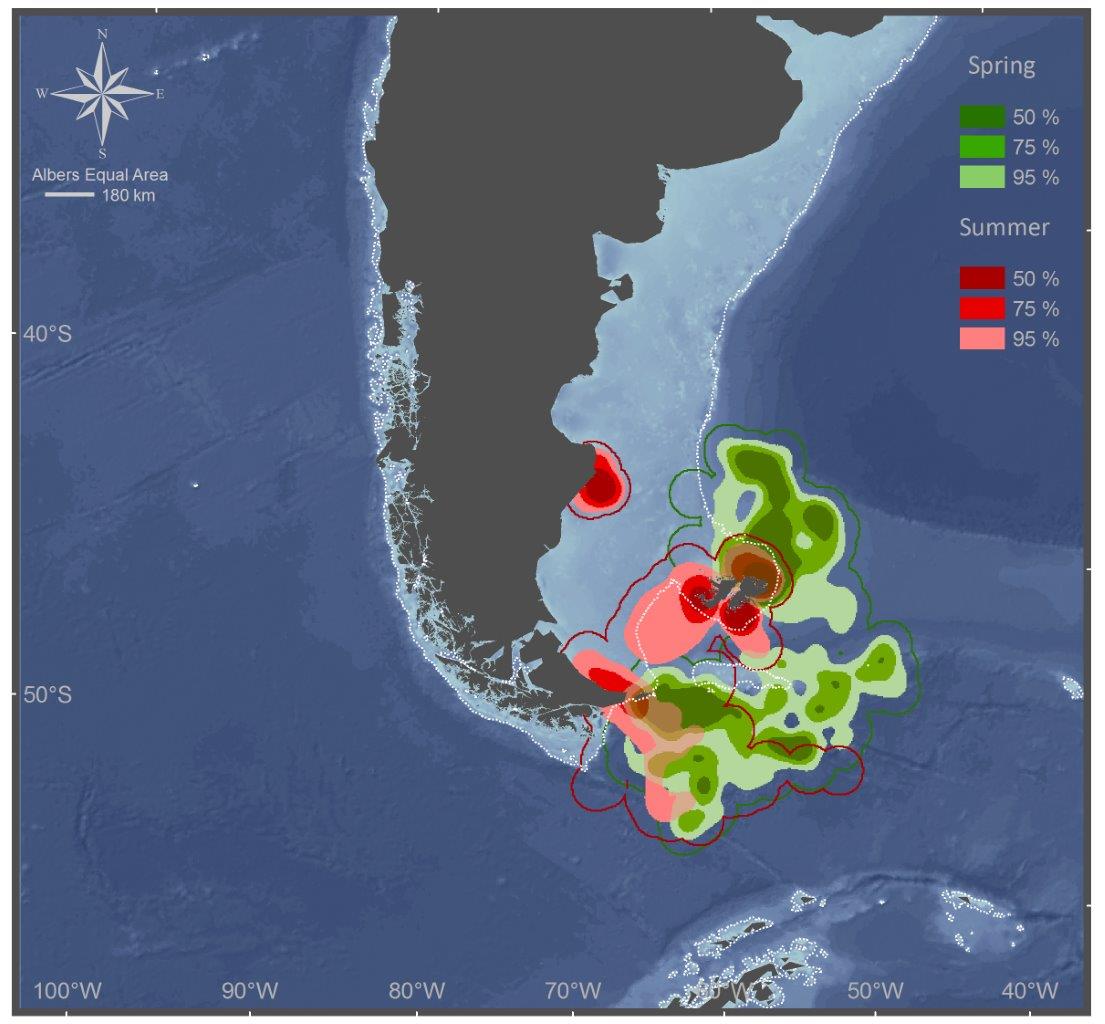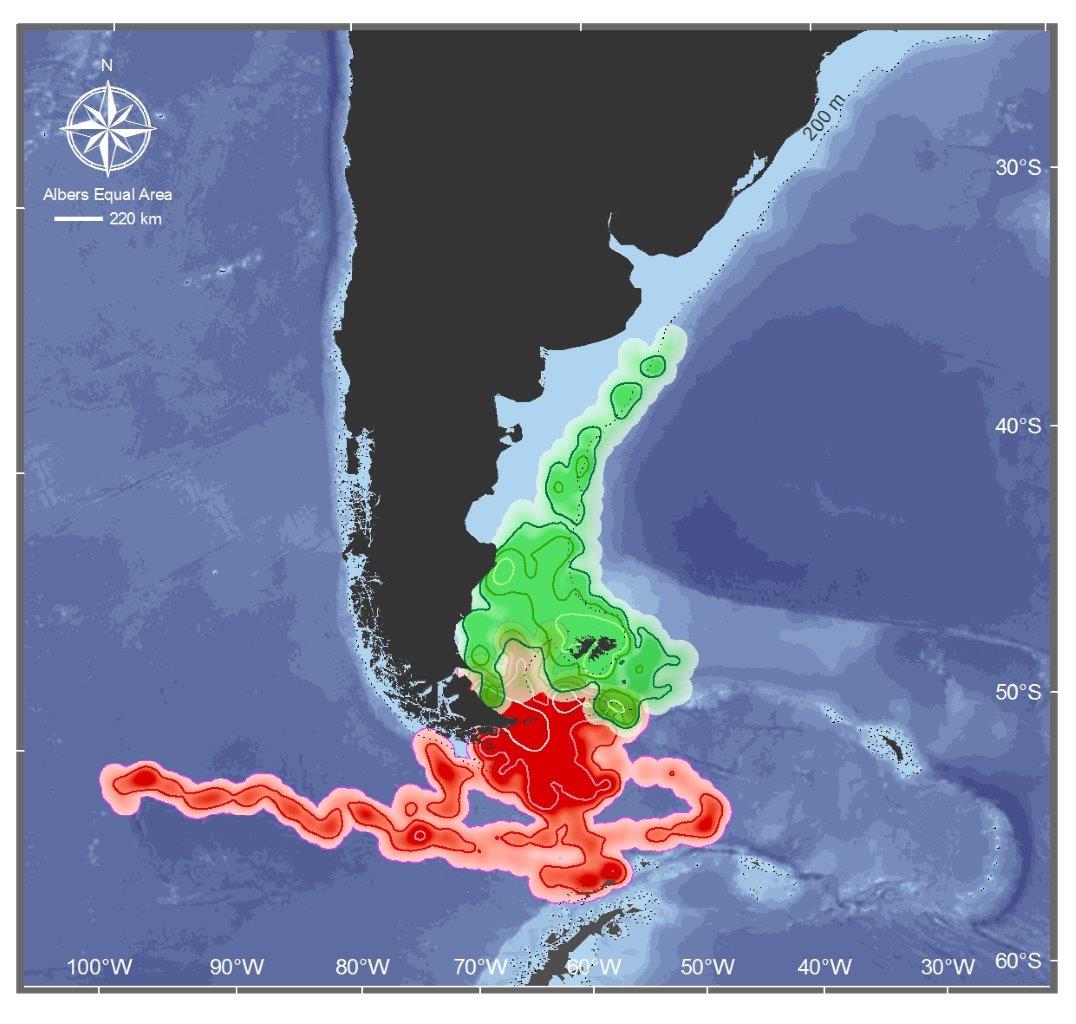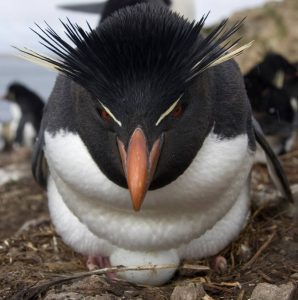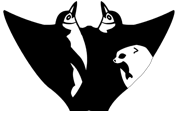The population of the Southern Rockhopper Penguin around South America has experienced variable trends over recent decades (1). Their breeding pair numbers on the Falkland Islands have declined dramatically, falling by more than 80% since the early 1930s (2), but there are indications for a stabilising trend, although numbers are still fluctuating extensively (3, 4). Comparative investigations into the ecology of Rockhoppers from the Falkalnds and from Staten Island, Argentina, have shown that the two populations differ in their diving behaviour (5) and their foraging areas during austral summer (6,7,8) and, in particular, over the winter period (8,9,10,11). In addition, evidence was found that the two populations belong to two genetic clusters (12). Apparently, Rockhoppers can also adapt their foraing behaviour according to the local environmental conditions, which could be confirmed in a multi-year study in Berkeley Sound, Falkland Islands (13). The diving behaviour of Rockhoppers from Isla Noir in Chile differed as well, indicating the potential for adaptations to the respective environments (14). This research has indicated that especially Rockhoppers from the Falklands are increasingly threatened by human activities such as fishing and oil exploration and exploitation (15). Phyologeographic comparisons indicated that the Southern Rockhopper is not only separate from the Northern Rockhopper Penguin, but also distinct from its Eastern conspecifics (16,17,18).

Rockhopper Penguin dispersal in spring and summer (green Falkland Islands, red Isla de los Estados)

Rockhopper Penguin dispersal in winter (green Falkland Islands, red Isla de los Estados)

- (1) Pütz, K., A. Raya Rey and H. Otley (2013) Southern Rockhopper Penguin.Pp 113-129 in: García Borboroglu, P.G. & P.D. Boersma (eds.) Penguins – Natural History and Conservation. University of Washington Press, Seattle U.S.A. ISBN 978-0-295-99284-6
- (2) Pütz, K., A.P. Clausen, N. Huin & J.P. Croxall (2003) Re-evaluation of historical Rockhopper Penguin population data in the Falkland Islands. Waterbirds 26: 169-175
- (3) Pütz, K., R.J. Ingham, J.G. Smith & J.P. Croxall (2001) Population trends, breeding success and diet composition of gentoo Pygoscelis papua, magellanic Spheniscus magellanicus and rockhopper Eudyptes chrysocome penguins in the Falkland Islands. Polar Biology 24: 793-807
- (4) Clausen, A.P. & K. Pütz (2002) Recent trends in diet composition and productivity of Gentoo, Magellanic and Rockhopper Penguins in the Falkland Islands. Aquatic Conservation 12: 51-61
- (5) Pütz, K., A. Raya Rey, N. Huin, A. Schiavini, A. Pütz & B.H. Lüthi (2006) Diving characteristics of Southern Rockhopper Penguins (Eudyptes c. chrysocome) in the Southwest Atlantic. Marine Biology 149: 125-137
- (6) Pütz, K., J.G. Smith, R.J. Ingham & B.H. Lüthi (2003) Satellite tracking of male Rockhopper Penguins during the incubation period in the Falkland Islands. Journal of Avian Biology 34: 139-144
- (7) Rosciano, N., K. Pütz & A. Raya Rey (2022) Where’s the best supermarket deal? Female southern rockhopper penguins show variable foraging areas during the guard stage at Isla de los Estados, Argentina. Canadian Journal of Zoology 100: 46–55
- (8) Lois, N.A., U. Balza, R. Brasso, S. Dodino, K. Pütz, M.J. Polito, L. Riccialdelli, J. Ciancio, P. Quillfeldt, B. Mahler & A.Raya Rey (2022) Mercury and stable isotopes portray colony-specific foraging grounds in southern rockhopper penguins in the Patagonian Shelf. Marine Pollution Bulletin 184: 114137
- (9) Pütz, K., J.G. Smith, R.J. Ingham & B.H. Lüthi (2002) Winter dispersal of Rockhopper Penguins Eudyptes chrysocome from the Falkland Islands and its implications for conservation. Marine Ecology Progress Series 240: 273-284
- (10) Pütz, K., A. Raya Rey, A. Schiavini, A.P. Clausen & B.H. Lüthi (2006) Winter migration of Rockhopper Penguins (Eudyptes c. chrysocome) breeding in the Southwest Atlantic: Is utilisation of different foraging areas reflected in opposing population trends? Polar Biology 29: 735-744
- (11) Raya Rey, A., P. Trathan, K. Pütz & A. Schiavini (2007) Effect of oceanographic conditions on the winter movements of rockhopper penguins Eudyptes chrysocome chrysocome from Staten Island, Argentina. Marine Ecology Progress Series 330: 285-295
- (12) Lois, N.A., L. Campagna, U. Balza, M.J. Polito, K. Pütz, J.A. Vianna, A. Morgenthaler, E. Frere, R. Sáenz-Samaniego, A. Raya Rey & B. Mahler (2020) Metapopulation dynamics and foraging plasticity in a highly vagile seabird, the southern rockhopper penguin. Ecology and Evolution 10: 3346-3355
- (13) Pütz, K., S. Harris, N. Ratcliffe, A. Raya Rey, S. Poncet & B. Lüthi (2018) Plasticity in the foraging behavior of male Southern Rockhopper Penguins (Eudyptes chrysocome) during incubation in the Falkland/Malvinas Islands. Polar Biology 41: 1801-1814
- (14) Raya Rey, R., K. Pütz, G. Luna-Jorquera, B.H. Lüthi & A. Schiavini (2009) Diving patterns of breeding female rockhopper penguins (Eudyptes chrysocome): Noir Island, Chile. Polar Biology 32(4): 561-568
- (15) Trathan, P.N., P. García-Borboroglu, P.D. Boersma, C.A. Bost, R.J.M. Crawford, G.T. Crossin, R.J. Cuthbert, P. Dann, L.S. Davis, S. de la Puente, U. Ellenberg, H.J. Lynch, T. Mattern, K. Pütz, P.J. Seddon, W. Trivelpiece & B. Wienecke (2014) Pollution, habitat loss, fishing and climate change as critical threats to penguins. Conservation Biology DOI: 10.1111/cobi.12349
- (16) Frugone, M.J., A. Lowther, D. Noll, B. Ramos, P. Pistorius, G.P.M. Dantas, M.V. Petry, F. Bonadonna, E. Poulin, A. Steinfurth, A.Polanowski, A. Raya Rey, N. Lois, K. Pütz, P.N. Trathan & J.A. Vianna (2018) Contrasting phylogeographic pattern among Eudyptes penguins around the Southern Ocean: the role of geographic distance and oceanic fronts. Scientific Reports 8: 17481
- (17) Frugone, M.J., T.L. Cole, M.E. López, G. Clucas, P. Matos-Maraví, N.A. Lois, P. Pistorius, F. Bonadonna, P. Trathan, A. Polanowski, B. Wienecke, A. Raya-Rey, K. Pütz, A. Steinfurth, K. Bi, C.Y. Wang-Claypool, J.M. Waters, R.C.K. Bowie, E. Poulin & J.A. Vianna (2021) Taxonomy based on limited genomic markers may underestimate species diversity of rockhopper penguins and threaten their conservation. Diversity and Distributions 21: 2277-2296
- (18) Green, C.-P., D.B. Green, N. Ratcliffe, D. Thompson, M.-A. Lea, A. Baylis, A.L. Bond, C.-A. Bost, S. Crofts, R.J. Cuthbert, J. González-Solís, K.W. Morrison, K. Pütz, A. Raya Rey, P.G. Ryan, P.M. Sagar, A. Steinfurth, J.-B. Thiebot, M. Tierney, T.O. Whitehead, S. Wotherspoon & M.A. Hindell (2023) Potential for redistribution of post-moult habitat for Eudyptes penguins in the Southern Ocean under future climate conditions. Global Change Biology 29: 648-667


